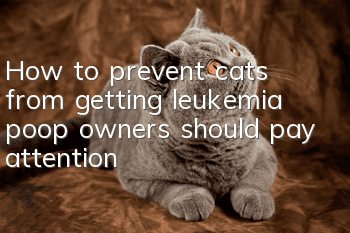How to prevent cats from getting leukemia, poop owners should pay attention!

How to prevent leukemia in cats, poop scoopers should pay attention to it! The cat is losing weight day by day, has diarrhea for a long time, has no energy, and looks wilted. Parents are very worried. The main characteristics of feline leukemia are malignant lymphoma, myeloid leukemia, degenerative thymic atrophy and non-regenerative anemia. Among them, the most fatal to cats is malignant lymphoma. The most frightening thing is that there is currently no breakthrough in medical treatment. Once a cat suffers from leukemia, it can only die in pain.
Why do cats get leukemia?
Why do cats get leukemia: The route of infection and the virus are mainly transmitted through the mouth. The saliva of infected cats contains high amounts of the virus, and the most common routes of infection are through bites and licking, sharing food dishes, and contact with the secretions and excrement of infected cats. Kittens can also become infected through the placenta or milk of the original mother cat.
Why cats get leukemia: Symptoms, infected cats may develop anemia, fever, difficulty breathing, loss of weight and appetite, gingivitis/stomatitis, lethargy, and reduced immunity, leading to a variety of infections The disease can cause death, and some cats may even develop tumors.
Why do cats get leukemia: In addition to rapid leukemia screening, diagnostic methods also include complete blood count (CBC) testing, which can also detect a decrease in red blood cells (anemia), white blood cells, and platelets in cats. reduce. Liver and kidney indices may also increase. Feline leukemia virus antigen detection (such as ELISA antigen detection), bone marrow sampling, tumor sampling, etc. can also be used for diagnosis.
Feline leukemia treatment: Once a cat is diagnosed, the infected cat should be completely isolated from the healthy cat, and the healthy cat should be given good nutrition, enhance immunity, and undergo regular physical health examinations. Currently, there is no effective treatment and can only be treated symptomatically according to the cat’s symptoms. Severely dehydrated cats are treated with intravenous drips and antibiotics. If the cat won't eat, he may have to be force-fed via a nasogastric or esophagogastric tube.
Feline leukemia prevention: To reduce the risk of infection in cats, try to reduce the cat’s exposure to other cats outside. If the cat owner is feeding stray cats, he must change the contaminated clothes when he returns home and clean them before picking up the cat at home. Additionally, viruses cannot survive on dry surfaces outside the body for more than a few hours and can be killed with common disinfectants.
- How many babies does a British Shorthair cat usually give birth to when pregnant?
- How to correct a cat’s food grabbing
- The best time and precautions for neutering Maine Coon cats
- What should you do if your cat has a cold and sneezes?
- Can a male cat be neutered when he is in estrus?
- How long does it take to cook chicken breast for cats?
- Can pregnant blue cats be fed amoxicillin?
- What are the symptoms of early pregnancy in cats?
- Why vets won’t let cats eat raw meat
- Can kittens that are one and a half months old undergo external deworming?



